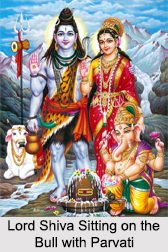 Vrishabha Vrata is counted amongst the eight auspicious austerities of the Hindu religion. It is observed when the Sun is in the "rishabha rashi" (Taurus Zodiac sign) in the month of "Baisakh" (mid May to mid June), on the "Ashtami" (eight moon day) of Shukla Paksha (growing lunar phase). If it falls during the Shukla Paksha on the eight day, then it is "Ashtami". Skanda Purana has the description of this Vrata.
Vrishabha Vrata is counted amongst the eight auspicious austerities of the Hindu religion. It is observed when the Sun is in the "rishabha rashi" (Taurus Zodiac sign) in the month of "Baisakh" (mid May to mid June), on the "Ashtami" (eight moon day) of Shukla Paksha (growing lunar phase). If it falls during the Shukla Paksha on the eight day, then it is "Ashtami". Skanda Purana has the description of this Vrata.
This Vrata is also known as "Vrishabha Sankranti" or "Vrishabha Sankranam" in some of the southern states and also as "Brusha Sankranti" in the Indian state of Odisha. Although this Vrata is dedicated to "Vrishibha", the Bull of lord Shiva, this day is also considered to be fortunate for Vishnu devotees.
Rituals of Vrishabha Vrata
The devotee of Vrishabha Vrata gets up early on the day of the Vrata and meditates on the "Parameshvara" and his consort, Uma being seated on a bull (Vrishava). One should start the worshipping after being purified by taking bath. The idol of "Rishabharudar" should be made from gold or silver. The lord should be anointed with the substances like "Panchamritam" and other holy things. The offerings of rice and "kheer" are also made to the God. Then to the kind-hearted devotees of Lord Shiva, different things are donated.
The devotees worship lord in the Shiva temple and return home happily. Later they take rice, sugar-rice, fruits and sweets along with other devotees without spoiling the intent of the austerity. The followers listen to the glories of Lord Shiva until late evening and then sleep on bare floor that night. The following day, after saluting the God, the observer of this Vrata donates the idol to a sincere follower of lord Shiva.
Significance of Vrishabha Vrata
One who observes this Vrishabha Vrata religiously, would get long life, wealth, wisdom and health and also wins eight great treasures. Lord Vishnu pleased Lord Shiva by this Vrata and got `Garuda` (the holy bird of eagle family) as his vehicle and also lots of treasure. Lord Indra got the elephant named `Airavata`, the Lord Agni got goat, Lord Yama got buffalo, niruthi got human, Lord Varuna got crocodile, Lord Vayu got deer, Lord Kubera got Pushpaka Vimana, Ishanor got the ox that resembles the justice, Lord Surya got the chariot of one wheel and seven horses and Lord Chandra got the special ruby airplane.
The entire god got their vehicles by pleasing "Rishabharudar" through Vrishabha Vrata. Once the Maharishi explained to the king of Maharashtra, Vishvasena all the things happening in past present and future. The King was astonished how this sage could know so many things. The sage replied it was because of the glory of Vrishabha Vrata. The king also started observing the austerity and he himself came to know all these things. King Santushta worshipped and observed this Vrata and got eight great attainments or `Ashtha Maha Siddhi`. He also got the `Moksha` or eternal liberation. Another King Vidrutha was also the observer of this Vrata. He roamed around the seven down worlds and the worlds of Lord Brahma, Lord Vishnu and Lord Indra. He transferred the knowledge of the Vrata to his sons and became Shiva Yogi.









